“If there ever comes a day when we can’t be together, keep me in your heart, I’ll stay there forever.”
* * *
“If you live to be a hundred, I want to live to be a hundred minus one day so I never have to live without you.”
* * *
“How lucky I am to have something that makes saying goodbye so hard.”
—Pooh, Winnie the Pooh
I can scarcely bring myself to write this, but my beloved husband, Michael, died almost instantly of a heart attack on the morning of Sunday, July 21, 2024.
I have lost my precious soulmate; my best friend; the love of my life; my kitty coparent; my inspiration; my creative partner; my favorite composer; my counselor; my constructive critic; my cheerleader; my spiritual and philosophical guide; and my wise, hilarious, and brilliant husband—something I didn’t think I would have to suffer for decades, if ever.
I have no words, too many words, not enough words.
I feel like I’ve been sawed in half and gangrene has set in. With each passing day, the pain becomes sharper as the shock wears off and gives way to the realization that this isn’t a dream. This is reality. This is permanent. This is forever.
Michael is my one and only—ever. We have been together for more than half our lives, and he is half my memories, half my mind, half my heart, half my soul.
I feel shattered, shell-shocked, disemboweled. There is a Jupiter-sized crater in our home, in my heart.
On July 21, I woke up at 3:59 am. Michael was already up. I would later learn from his Apple Watch that he had slept four-and-a-half hours and had a 36-percent sleep deficit. This wouldn’t have worried him. Very little did.
After changing kitty water bowls and feeding the indoor and outdoor kitties, I made Michael’s usual breakfast: two fried eggs with broken yolks served over my homemade keto bun with a side of bacon.
I brought him his breakfast and kissed him, like I always did. He took the plate, kissed me back, and thanked me, like he always did.
He usually played a video while eating. He checked his YouTube feed and found a recent interview with Whitney Webb.
“Have we seen this already?” he asked.
“I think so, but it’s important enough that it’s worth watching again,” I replied as I started laying down strips of bacon in a pan to replenish the batch he’d just finished.
After the video finished playing and I’d placed the bacon in the toaster oven, I went out back to pick up a kitty plate and noticed a bumblebee caught in a cobweb. I helped him flee the web. He tried to fly away, but he couldn’t figure out how to escape the wisteria-laden pergola and kept winding up back in the cobwebs. I retrieved a broom from the garage and brushed away the gossamer so the bumblebee could fly free.
While I had the broom in my hand, I decided to sweep away the cobwebs from the front. Just as I was about to open the front door, Michael asked, “What’re you doing?”
“I’m sweeping away the cobwebs. I just had to rescue a bumblebee from the back again and don’t want any more bugs to get hurt.”
“You’re going to destroy the spiders’ homes?” he asked. His nickname is the Patron Saint of Insects (which should really include “and Spiders”) because he is fiercely protective of all forms of life and thinks people should leave nature alone.
“One is a matter of life-and-death, and the other is a temporary inconvenience, so I’ll choose destroying homes.”
I started sweeping the front walkway at 5:19 am and returned inside at 5:33 am according to our security camera.
I noticed Michael had turned around in his recliner with his head tucked into a pillow. This usually meant he didn’t feel well, so I got worried.
“What’re you doing?” I asked.
“I’m having chest pain,” he said. “I had some yesterday after eating, too.”
“Do you think it’s heartburn?” I asked.
“No, it’s not heartburn.”
“Do you think it’s a heart attack?”
“I don’t think so. It’s just very uncomfortable.” I didn’t know those were the last words he would ever speak to me.
I had an ominous feeling, but he didn’t like me hovering when he felt ill, so I went to the bathroom. I decided to suggest he take an aspirin and consider going to the hospital when I got back.
But I didn’t get a chance to.
I heard a thud.
Our fluffy ginger kitty, Sunny, froze in the hallway and stared toward the living room.
I raced out and found Michael lying on his back, propped up at an angle on a pile of blankets and clothes.
He was gazing straight ahead, silent. Then he let out a gasp.
“Michael? Michael?!!” I yelled.
I ran to the kitchen to grab my phone and dialed 911 at 5:37 am.
I put the phone on speaker as the operator instructed me on CPR. I performed chest compressions, and we both shouted “1, 2, 3, 4” as I did them.
“You’re doing great,” the operator said. “Keep going.”
Michael began gasping, so I thought I was saving his life.
I did hundreds of compressions punctuated by screams of, “Fight, baby!,” “Michael! Stay with me!,” and “I love you, Michael!” until the paramedics arrived at 5:44 am.
The operator let me know the paramedics were almost at the door. She had me stop the CPR so I could run and unlock it.
Paramedics, police, and firefighters poured into our cluttered house.
“Start clearing this out,” one said. I tossed the recently delivered boxes of cat food from the entryway into the hallway while the firefighters shoved aside furniture, weightlifting equipment, piles of books, and everything else in their way. Kitties flew in all directions, seeking hiding places and yowling in terror.
The paramedics pulled Michael onto the floor, got him flat on his back, and started CPR. They performed multiple rounds of shocks and epinephrine injections. Everything was happening in fast-motion and slow-motion at the same time.
An empathetic policeman asked if there was anyone I could call, so I dialed my mom’s number. It was 5:55 am.
“Michael had a heart attack, and the paramedics are here,” I told her. “Can you come over and take me to the hospital?”
“Oh no!” she cried. “I’ll be right over, baby.”
I asked the officer if I should get dressed to go to the hospital. That’s when he explained they had to get Michael stabilized before transporting him.
I watched them taking turns doing CPR, testing, and shocking him.
Then the policeman pulled me into the kitchen and explained Michael hadn’t had a heartbeat for thirty-five minutes. They had followed all of the protocols and did everything the maximum number of times they were permitted, but he didn’t respond to any of them, and his brain had gone without oxygen the entire time.
He called a doctor, explained the medical details, and got the go-ahead to declare him dead.
A gentle female officer pulled me outside the front door and asked if I needed anything. She patted my shoulder as I stood paralyzed in shock, my shaking hands pressed against my cheeks.
A couple minutes later, my mom pulled up, and the policeman greeted her, explaining, “I’m sorry, we did everything we could, but we couldn’t save him. He passed away. You’d better go check on your daughter because she’s taking it really hard.”
My mom’s hands flew to her face, covering her mouth. “Oh no!” she gasped in horror.
I met her in the driveway. We hugged and broke into sobs, both in disbelief.
My mom and I went inside at 6:37 am, exactly one hour after I’d dialed 911.
The paramedics were cleaning up the aftermath of ripped-open bags, plastic caps, and other detritus of their life-saving attempts.
One of them took the soft purple blanket from Michael’s recliner and laid it over him with his face exposed, the breathing equipment still in his mouth with blood spatters around the mouthpiece.
The male officer hugged my mom and me before he left. Everyone was exceptionally kind and expressed their sympathy as they departed.
The policewoman stayed behind with my mom and me while we waited for the funeral home employees to arrive. My mom had recommended the home she’d used for my step-father almost two years ago.
I crouched beside Michael’s still body, caressing his face; clasping his cold hand with its bluish fingernails; and whispering, “I love you, Michael,” followed by, “Damn you, why did you have to leave me?!” And then more “I love you”s and sobs and wails and gasps.
The policewoman asked if I wanted to remove his wedding ring and offered to do it if I couldn’t.
I wanted to do it. The ring was so tight, I had to twist and pull it over his knuckle. I didn’t want to hurt him. I know that doesn’t make sense, but I wanted to be careful of his thin pale fingers.
I put it on my pinkie. It was loose, so I moved it to my right ring finger, where it was too tight, but I kept it there anyway.
When the funeral home employees—a soft-spoken black man and tattooed white man with dreads—arrived, they asked me if he had any jewelry I wanted to get, so I told them about his obsidian yin-yang pendant. It only cost $19 but was priceless to me as he had worn it next to his heart since purchasing it just over a year ago.
They couldn’t get it over the medical equipment, which they’re not allowed to remove, so they said I could pick it up from the funeral home later.
They asked if I wanted to leave the room while they placed him in a bag, but I said I wanted to stay. I wanted to be with him for as long as I could and bear witness to what he experienced. Once he was in the bag, they asked if I’d like a moment with him before they took him away, so I cradled his shoulders through the black bag. It didn’t feel like him anymore, so I let his body go.
After they left, I unpacked the boxes of cat food that had gotten dumped into the hallway, and I began piling empty boxes in the garage. Normally, Michael would be the one to break them down for recycling week, but that is going to be my job now—just like emptying the litter boxes; cleaning the toilets; washing the pots, pans, and silverware; and everything else I know and don’t yet know he did.
I finished cooking the bacon I’d started earlier and unloaded the dishwasher.
“It feels wrong doing mundane things,” I told my mom.
“It probably helps distract you,” she said.
I made my mom the same breakfast I had made Michael.
After she ate what little she could, my mom called one of my uncles while I scrubbed blood drops out of the carpet, sprayed them with enzyme cleaner, and covered them with the microwave covers we use after cleaning up hairballs.
I vacillated between shock and gut-twisting grief. I felt sick to my stomach. I was trembling.
My mom and I spent hours weeping and recalling happy memories of Michael, who had saved both of our lives multiple times. He had supported my mom after her two hip surgeries; driven her to the hospital during a life-threatening emergency; handled all household duties for two months while I was incapacitated by an excruciating back injury; and cared for our furred and feathered babies after I developed a rare, potentially fatal lung disease and had to relocate to my mom’s while we searched for a new place to live. Michael then handled all the packing, cleaning, and loading of the U-Haul to spare me from exposure to the lung-inflaming antigens.
I started searching for the kitties. All had disappeared into hideyholes, and I had only been able to find four of the eight who were in that part of the house that morning. I feared one or more might have flown out the front door during the chaos.
I called the missing kitties’ names over and over again while scouring the house. I eventually found a fifth, then a sixth and seventh, and finally an eighth, so all were accounted for by evening (one had been safely tucked in the bedroom, and the rest are outdoors so were blessedly oblivious).
That night, a catcophony of mournful lowing, pitiful squeaking, and insistent meowing reverberated throughout the house. The kitties are generally fairly quiet and had never done anything like that before, let alone simultaneously.
Sensing I needed comforting, the kitties took turns cuddling on my lap, purring, and making biscuits as I sobbed.
Sixteen hours after waking up that fateful, fatal morning, I managed to eat. I made the same simple meal I’d made for Michael and my mom, except I swapped in my keto bagel bread toast for the keto bun. I always saved the buns for Michael, so it felt wrong to eat one.
I shoved tasteless blobs into my face. At a certain point, I forgot what I was chewing and could not detect it from the taste. I deduced from the texture it was the toast.
Michael’s startling two-minute trajectory from casually mentioning chest pain to death is a reminder that those of us who evaded the experimental injection are not invincible, much as we may begin to feel so as we watch the injected fall ill and collapse around us.
We are still mortal and vulnerable to dying suddenly in all the old-fashioned ways.
Michael was diagnosed with diabetes in 1999 after having lived on soda, candy, and fast food his entire life. He reversed it by switching to diet soda and embarking on a stringent American Diabetics Association (ADA) diet, but we later learned the ADA diet was unsustainable and only exacerbated the underlying insulin resistance causing his diabetes.
He eventually adopted a low-carb diet combined with intermittent fasting, successfully getting his blood sugar to manageable levels. He even gave up soda and caffeine, making his own drinks using sugar-free syrup and stevia drops. He didn’t smoke, drink, or use drugs (not even prescription) and otherwise appeared healthy. He never got the flu, colds, or other respiratory illnesses.
What he wasn’t carefully monitoring was his blood pressure. Once he did finally check it a little over a year ago, it was so high, he didn’t tell me because he didn’t want me to worry. I only found out after pressing him. I got him a blood pressure supplement, which appeared to help. It required him to take eight pills a day, though, and he hated taking a lot of pills, so he stopped. He was okay with smaller numbers of pills so did take aged garlic, hawthorn berry, bitter melon, a multivitamin, and vitamin D.
A few weeks ago, Michael had begun playing a Dr. Abs video we suspected might be a propaganda hit piece on vitamin D. We’d never heard of Dr. Abs before so didn’t know what to expect.
As Michael played the video in the background while we worked, we realized it was packed with valuable information.
“He’s actually really knowledgeable,” I said.
“No, he rocks,” Michael said. He had instantly reversed his preconceived notions, which was characteristic of his ability to humbly recalibrate his views based on new information.
Dr. Abs wasn’t condemning vitamin D supplementation but explained it needs to be complemented with vitamin K to prevent calcification of the arteries. Michael asked me to get some vitamin K, so I added it to our next Amazon Subscribe & Save order. It arrived eight days after his death.
I wonder if it might’ve helped if we’d learned about it sooner—or incorporated the recommendations in this article by A Midwestern Doctor had it been published before Michael’s passing.
Michael had refused to go to the doctor for years. Considering medical errors were determined to be the third leading cause of death in 2017 and most doctors are just highly paid pushers of detrimental drugs like statins, I didn’t blame him.
The last time he’d had a medical encounter of any kind was when he had emergency gall bladder surgery, I think around 2008. Even that involved three days of excruciating pain before he drove himself to the hospital, at which point it had gone septic.
We got a reprieve from that brink-of-death scenario but not a long enough one.
Michael was the type to suffer in silence because he didn’t want to burden me. Maybe if he’d told me about his chest pain the day before, we could have acted on it and saved his life. He evidently felt better, though, so he didn’t tell me. He probably wouldn’t have even told me about his chest pain on Sunday if I hadn’t asked what he was doing.
Heart disease runs in Michael’s family. His grandma died of a heart attack in her forties. He was nine and noticed her having chest pain while she and her grandpa were watching a monster movie. His grandpa panicked, so Michael walked calmly over to the phone and dialed 911. Unfortunately, the paramedics were incompetent and pumped air into her stomach instead of her lungs (he noticed her stomach kept getting bigger, and he knew that was wrong, even as a child), and she died.
When he was three months old, his mother died in a car accident, but the coroner said it wasn’t the accident that killed her but her heart (he said her heart exploded), so it was clearly genetic.
Those formative experiences of mortality left Michael with a profound sense of the fleetingness of life, and he continually reminded me to savor every moment, spending it with those you love and filling it with meaning, purpose, and creativity.
He had also been working himself extremely hard the past several months, barely sleeping. He’d been intensively studying mixing and mastering so he could finally finish his enormous backlog of music compositions. This was my dream come true because I had been begging him to finalize and export his compositions for years.
Some of you may recall his music from my videos (he is listed under his birth name, Shawn Patrick Michael). Just over a year ago, he composed an original score for Ode to a Whistleblower, which was played during the tribute to Daniel Ellsberg at the Whistleblower Summit on July 30, 2023, National Whistleblower Day.
My other videos feature rough drafts of compositions not up to Michael’s exacting standards, but I was grateful he let me use them because they deepened the emotional poignancy of my words and the evocative deliveries, elevating the videos to art. These include Tess Lawrie’s and Mike Yeadon’s world-waking readings of Mistakes Were NOT Made; my reading of Hard Lessons; and Doc Malik’s reading of Eulogy for the COVID Kapos.
I was so giddy about the progress he was making toward publishing his music, he kept joking that I was going to wake up from my dream, saying, “You’re going to wake up!” every time he noticed how happy I was.
Well, I woke up.
And every day since July 21, I wake up again.
Then the film reel of that morning starts replaying in my head. I analyze each second to see if I could have done something different that would have resulted in his life being saved.
When I leapt into action and called 911, I was thinking how proud he was going to be of me for remaining calm in a crisis. He was always the one with a cool head, whereas I would fly into a panic—or at least that’s how he saw it. I would usually get hyper and throw out a bunch of ideas for resolving the situation, whereas he would focus on what needed to be done.
So that’s what I tried to do. Tragically, it wasn’t enough.
If I had insisted on calling 911 at 5:35 instead of 5:37, would that have made a difference?
I don’t know. I’ll never know. But I do know he probably wouldn’t have let me call since he didn’t think it was a heart attack. I wish I had asked, though, so I wouldn’t be tormented by wondering if he would have said yes.
I can no longer pretend this is a nightmare. The anesthetizing shock has metamorphosed into a raw, throbbing, putrefying agony.
I see Michael’s empty recliner and office chair, and I realize his absence is bitterly, indelibly, irreversibly real.
Our favorite book when we got married was Sheldon Vanauken’s memoir A Severe Mercy. It was one of many books we read aloud together, and I remember Michael could barely get the words out as we sobbed through the pages where Sheldon (“Van”) describes his dearling Davy’s disease, decline, and death at the age of forty.
In the beginning of the book, Van talks about how when he was fifteen, he was struck by the following insight:
“He was suddenly overwhelmed by the revelation that what makes life worth living is, precisely, the emotions.… What is beauty but something that is responded to with emotion? Courage, at least partly, is emotional. All the splendour of life. But if the best of life is, in fact, emotional, then one wanted the highest, purest emotions: and that meant joy. Joy was the highest. How did one find joy? In books it seemed to be found in love—a great love … So, if he wanted the heights of joy, he must have, if he could find it, a great love. But in the books again, great joy through love seemed always to go hand in hand with frightful pain. Still, he thought, looking out across the meadow, still, the joy would be worth the pain—if, indeed, they went together. If there were a choice—and he suspected there was—a choice between, on the one hand, the heights and the depths and, on the other hand, some sort of safe, cautious middle way, he, for one, here and now chose the heights and the depths.
“Since then the years had gone by, and he—had he not had what he chose that day in the meadow? He had had the love. And the joy—what joy it had been! And the sorrow. He had had—was having—all the sorrow there was. And yet, the joy was worth the pain. Even now he reaffirmed that long-past choice.”
Michael and I, too, chose “the heights and the depths” as we read that passage together. To us, that didn’t mean risky sensation-seeking, which we disdained, but rather feeling intensely, thinking deeply, creating passionately, and loving fiercely.
It meant being fully present throughout our unwavering friendship and inseparable companionship and never taking one another for granted.
I wish I could say I was always wholly present as Michael was sharing things with me—and I did record thousands of his wise insights over the years—but as an introvert, I often became lost in thought while working, and it would take me a moment to realize he was speaking. This happened so often, he had taken to saying, “Are you listening?” before he started talking.
Michael frequently reminded me there are no do-overs in life, and once the moment passes, it cannot be recaptured. On September 4, 2009, he said:
“People are countdown timers. Don’t forget that.”
The following month, on October 20, he said:
“Days are counted. One day is one of our last.”
Then on November 1, he said:
“In heaven, everyone knows their deathday. No one remembers their birthday. And everyone says it proudly.”
On June 6, 2010, he said:
“I hate wasting time. I can’t waste any time. Try going to the bank and withdrawing time.”
As the security guard, Brian, cautions Johnny in Mike Leigh’s Naked, “Don’t waste your life.”
On August 12, 2010, Michael said:
“Tomorrow isn’t there.”
Three years later, on November 6, 2013, he said:
“If you want to know when the end of the world is, it’s when you die.”
On New Year’s Day, 2018, at 12:45 am, Michael said:
“You can miss your entire life by just simply not being there.”
Ferris Bueller says it another way:
“Life moves pretty fast. You don’t stop and look around once in a while, you could miss it.”
As Mary Oliver piercingly asks in The Summer Day:
Doesn’t everything die at last, and too soon?
Tell me, what is it you plan to do
with your one wild and precious life?
On January 3, 2021, at 5:42 pm, Michael said:
“Life is what you’re doing when you’re not afraid.”
Several months ago, on March 28, 2024, at 11:20 am, he said:
“Life isn’t something to chew up and spit out. Life is something to flow through you.”
Just a few days before his death, Michael wrote down the following statement and later read it to me:
“Life guides me. How? By not presupposing my direction. Discovery, rather than seeking. Finding, rather than looking. Being, rather than willing.”
It is only later when we can no longer see, touch, or feel the breath of a beloved that we realize each second with them was a gift, and “attention must be paid.”
Michael always paid attention. On May 14, 2009, he said:
“I remember so much of my life because I was paying attention the whole time. Every little moment, every movement a person made. People think that people with AS [Asperger’s syndrome] don’t notice things about people. That’s crazy. They notice minute details about them. But there’s something about looking at another person’s face that hurts someone autistic.”
For him, awareness made the difference between living and sleeping through life, and he aimed to be completely present for every irreplaceable moment.
Having been blessed with the heights throughout our joyous marriage, I am now suffering the depths, pitched past pitch of grief.
Never again will I be able to ask Michael a question, and I already have hundreds burgeoning into thousands.
Never again can I share something only the two of us would care about.
Never again will we exchange inside jokes; lines from favorite movies, shows, or books; or funny anecdotes about our kitties.
Never again will he read books, articles, memes, or comments to me.
Never again will he queue up a playlist of music or videos to delight, touch, or provoke thought in me.
Never again will we make each other laugh (actually, he is still making me laugh as I read through his notes, correspondence, writings, and quotes, so I am thankful for that consolation).
Never again will he enfold me in a bear hug that lasts minutes before we tear ourselves away from one another.
Michael’s favorite show was The Twilight Zone. It served as an oasis amidst his tumultuous, death-stained childhood.
We were both moved by Ross Martin’s portrayal of grief in Death Ship, and I couldn’t help thinking of that scene during my own lamentations.
On February 14, 1884, Teddy Roosevelt scrawled a large ‘X’ and wrote in his diary, “The light has gone out of my life.” I learned about this after I found the following image while going through Michael’s pictures.
That bleak Valentine’s Day, the twenty-five-year-old Teddy lost his forty-eight-year-old mother to typhus—followed hours later by the death of his wife, Alice, to Bright’s disease at just twenty-two years old. Two days prior, she had given birth to their first and last daughter, herself christened Alice.
I now understand how Teddy felt when he scribbled those words.
In her email notifying family members of Michael’s death, my mom wrote:
“I’ve never seen two people more in love, more in sync with each other. This is going to be very difficult for her.… Michael was very, very dear to me too, like my son.”
While I was enduring the greatest physical pain of my life this past spring (little did I know it was soon to be eclipsed by the most agonizing emotional and psychological pain of my life), Michael read me the following quote by Marcus Aurelius:
“Nothing happens to anybody which he is not fitted by nature to bear.”
Although I am living through the fear that has haunted me throughout our nearly thirty-two years of marriage (my one recurring nightmare is being separated from Michael and unable to contact him), there is one thing I feared more, and that is that I would go before Michael.
I was all that was tethering him to this world. He would probably have asked my mom to care for our kitties before putting himself out of his misery—whether directly or by starving himself to death; hiking into the mountains and dying of exposure; or simply losing all will to live and withering away from heartbreak.
Michael was the Apocal- to my -optimist. He once told me:
“You expect too much of people. I expect too little. That’s why we’re perfect together.”
I keep returning to the following passage from Viktor Frankl’s Man’s Search for Meaning:
“Once, an elderly general practitioner consulted me because of his severe depression. He could not overcome the loss of his wife who had died two years before and whom he had loved above all else. Now, how could I help him? What should I tell him? Well, I refrained from telling him anything but instead confronted him with the question, ‘What would have happened, Doctor, if you had died first, and your wife would have had to survive you?’ ‘Oh,’ he said, ‘for her this would have been terrible; how she would have suffered!’ Whereupon I replied, ‘You see, Doctor, such a suffering has been spared her, and it was you who have spared her this suffering—to be sure, at the price that now you have to survive and mourn her.’ He said no word but shook my hand and calmly left my office. In some way, suffering ceases to be suffering at the moment it finds a meaning, such as the meaning of a sacrifice.”
It is this sacrifice that helps me make sense of Michael’s catastrophic death. By shouldering this cosmic emptiness, this aching, bottomless homesickness in my heart, I am sparing him the unendurable.
The day after Michael’s death, I connected with a mentor who lost his daughter in 2019. His response touched me so deeply, I requested his permission to share it:
“We are so sorry to hear your devastating news. I at least had time to prepare for E—’s death, but to have Michael gone so suddenly would be agonizing. People did not know what to say to me when E— passed, and I am equally at a loss for words now. But I will say this: Love is real. And love is stronger than death. Those are two things I know. But loss and grief are also real, as will be the hundreds of ways you will be ambushed by grief at unexpected moments. Nevertheless, love endures.”
This reminded me of my favorite poem, “Love Abides,” which I have described as “a poem I always turn to in times of grief, loss, and despair.”
I will leave you with that poem followed by several others that have accompanied me during the torturous days following Michael’s departure as I continue to remind myself that love abides.
Love Abides
by Barbara Pescan, Morning Watch: Meditations
Often we are found in our grief and comforted
calmed by some kindness
brought alive again by beauty
that catches us undefended.
Even when the sun is most thin and far
even at the hour the storm is at its height
we can go through
renewal nests within sorrow
love abides, even beyond anger, beyond death.
We are held in an embrace invisible but infinite
moving with all creation
between wholeness and fragmentation
moving always toward the one.
Small joys and great sorrows pass
and we, with steps uncertain, move on
to whatever is next
but continually seen, heard, held
by Life infinite and remote, intimate and abiding.
Love, do not let us go. Amen.
‘No worst, there is none. Pitched past pitch of grief.’
by Gerard Manley Hopkins, Poems & Prose
No worst, there is none. Pitched past pitch of grief,
More pangs will, schooled at forepangs, wilder wring.
Comforter, where, where is your comforting?
Mary, mother of us, where is your relief?
My cries heave, herds-long; huddle in a main, a chief
Woe, wórld-sorrow; on an áge-old anvil wince and sing —
Then lull, then leave off. Fury had shrieked ‘No ling-
ering! Let me be fell: force I must be brief.”’
O the mind, mind has mountains; cliffs of fall
Frightful, sheer, no-man-fathomed. Hold them cheap
May who ne’er hung there. Nor does long our small
Durance deal with that steep or deep. Here! creep,
Wretch, under a comfort serves in a whirlwind: all
Life death does end and each day dies with sleep.
Carrion Comfort
by Gerard Manley Hopkins, Poems & Prose
Not, I’ll not, carrion comfort, Despair, not feast on thee;
Not untwist — slack they may be — these last strands of man
In me ór, most weary, cry I can no more. I can;
Can something, hope, wish day come, not choose not to be.
But ah, but O thou terrible, why wouldst thou rude on me
Thy wring-world right foot rock? lay a lionlimb against me? scan
With darksome devouring eyes my bruisèd bones? and fan,
O in turns of tempest, me heaped there; me frantic to avoid thee and flee?
Why? That my chaff might fly; my grain lie, sheer and clear.
Nay in all that toil, that coil, since (seems) I kissed the rod,
Hand rather, my heart lo! lapped strength, stole joy, would laugh, chéer.
Cheer whom though? the hero whose heaven-handling flung me, fóot tród
Me? or me that fought him? O which one? is it each one? That night, that year
Of now done darkness I wretch lay wrestling with (my God!) my God.
Three Elegiac Poems
by Wendell Berry, The Selected Poems of Wendell Berry
I
Let him escape hospital and doctor,
the manners and odors of strange places,
the dispassionate skills of experts.
Let him go free of tubes and needles,
public corridors, the surgical white
of life dwindled to poor pain.
Foreseeing the possibility of life without
possibility of joy, let him give it up.
Let him die in one of the old rooms
of his living, no stranger near him.
Let him go in peace out of the bodies
of his life—
flesh and marriage and household.
From the wide vision of his own windows
let him go out of sight; and the final
time and light of his life’s place be
last seen before his eyes’ slow
opening in the earth.
Let him go like one familiar with the way
into the wooded and tracked and
furrowed hill, his body.
II
I stand at the cistern in front of the old barn
in the darkness, in the dead of winter,
the night strangely warm, the wind blowing,
rattling an unlatched door.
I draw the cold water up out of the ground, and drink.
At the house the light is still waiting.
An old man I’ve loved all my life is dying
in his bed there. He is going
slowly down from himself.
In final obedience to his life, he follows
his body out of our knowing.
Only his hands, quiet on the sheet, keep
a painful resemblance to what they no longer are.
III
He goes free of the earth.
The sun of his last day sets
clear in the sweetness of his liberty.
The earth recovers from his dying,
the hallow of his life remaining
in all his death leaves.
Radiances know him. Grown lighter
than breath, he is set free
in our remembering. Grown brighter
than vision, he goes dark
into the life of the hill
that holds his peace.
He’s hidden among all that is,
and cannot be lost.
The music score at the beginning of this post is “The Tension of Purpose,” the last composition Michael was mixing and mastering before his death. This is the draft he exported several days before finalizing the master, which I have not yet figured out how to export due to technical challenges such as plugins not loading. I have an enormous learning curve ahead of me as I acquire the knowledge and skills necessary to share Michael’s immense creative legacy, but it also gives me a sense of even deeper purpose and enables me to spend more time with the gifts he left behind.
P.S. If you are a friend or family member who is learning what happened through this post, I’m sorry. You are likely on my list of people to notify, but I just haven’t had the energy to reach out to everyone I would like to.
© Margaret Anna Alice, LLC
🙏 Thank You for Buoying Me Up 🙏
My livelihood is in your hands. Thank you for helping me survive—both financially and emotionally. Writing is my lifeline out of pain. I could not do this meaningful work without your loving support.
🤲 One-Time Support
Note: Purchasing any items using Amazon affiliate links included in my content will further support my efforts to unmask tyranny.


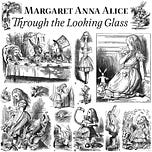


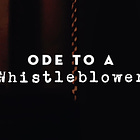
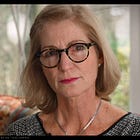
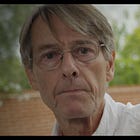
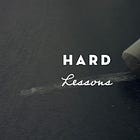
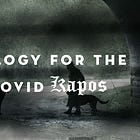
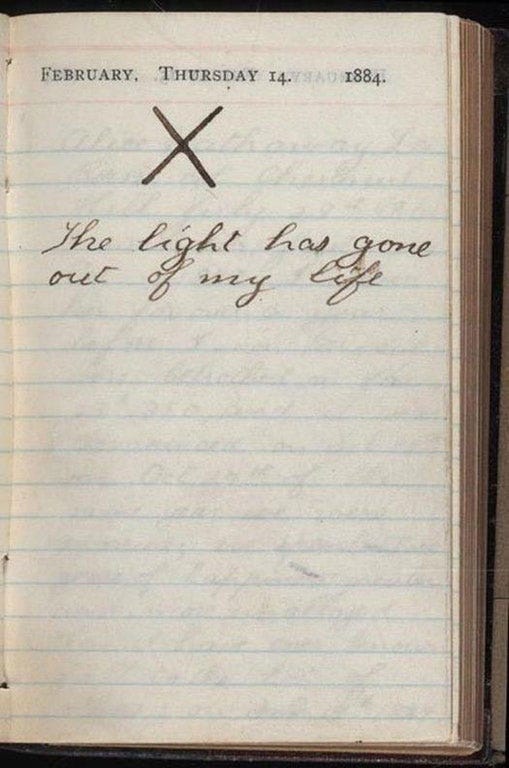

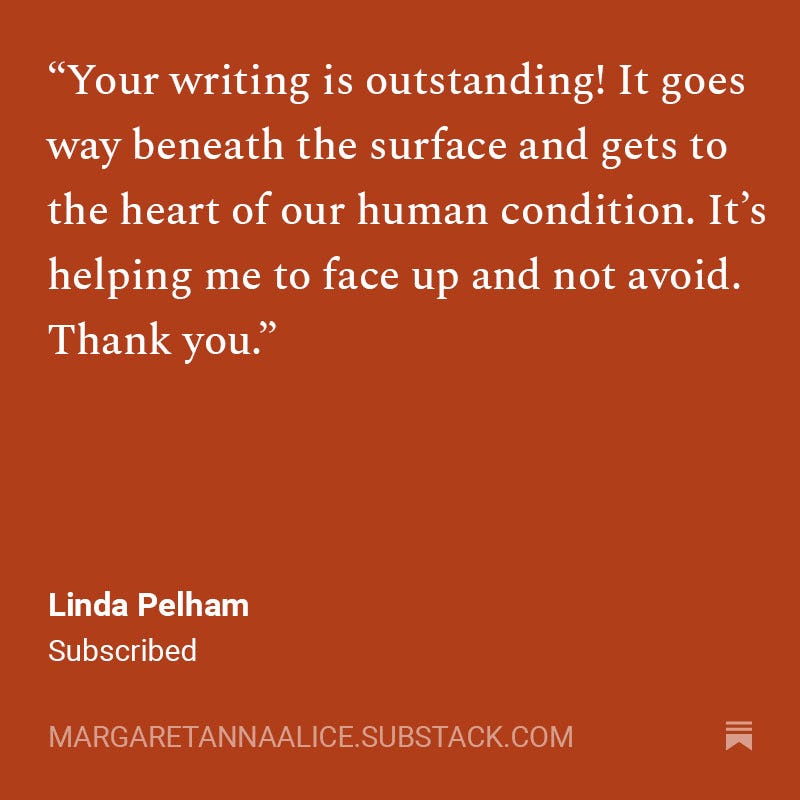


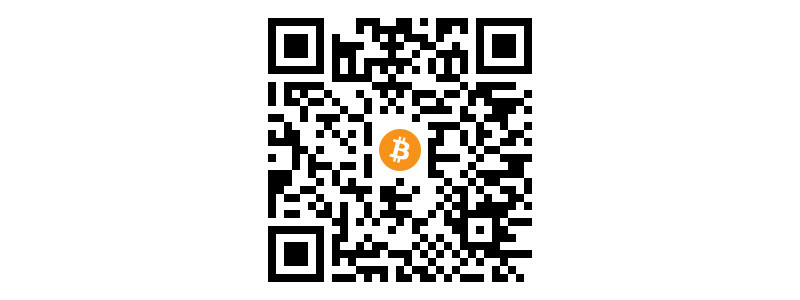



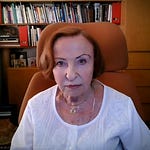
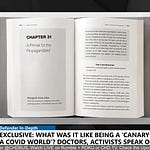
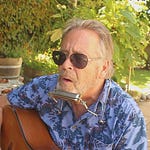




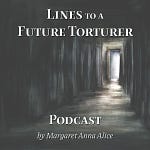
Share this post